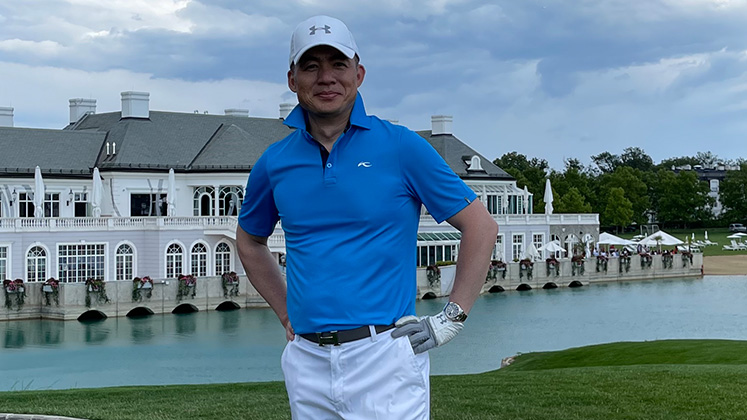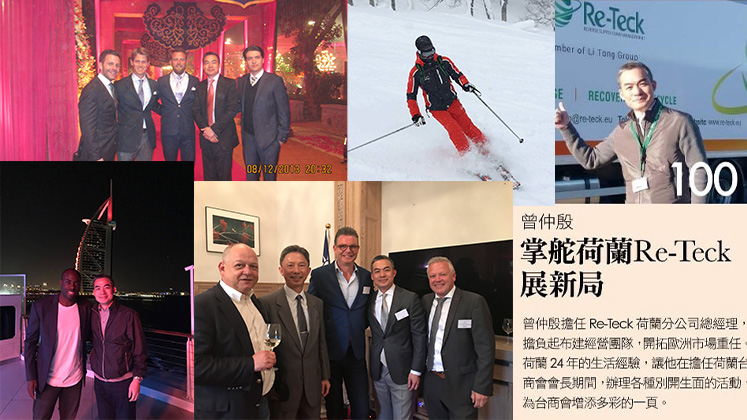
Tell us about yourself.
My name is Edward Tseng, an LSE EGMiM graduate of class 2014. I’m originally from Taiwan and have been living in Europe since January 1991. I came to Europe as a student and spent the first 3 years in Switzerland. Since then, Europe has become my “first” home, longer than the time I spent in Taiwan. This was never my initial plan, but life is full of surprises and plans always fall behind changes.
I got my first job offer from an IT company before graduating from the management school in Switzerland. As a young and fresh graduate, I told myself I had nothing to lose and was ready to take on the unknown challenges ahead. I packed my luggage and flew to New York from Switzerland in November 1994. That was my first ever visit to the US, just like my first ever visit to Europe 3 years earlier. The job was to set up a branch office for a Taiwanese IT company in Europe. During the 9 months living in the US, tons of preparations were to be accomplished, including choosing which country to set up the office and distribution centre, comparing the pros and cons of shortlist countries, receiving on-job training in various departments, and getting all required papers done to kick off my first real job. It was a big job, as well as a mind opening experience both in business and leisure.
In 1995, a new life started in the Netherlands. The 1990s were a golden age for the IT industry. The technology evolved rapidly. In order to be competitive, all IT companies had to continuously be innovative. Fortunately, although the business had gone through a lot of ups and downs, we continued to grow and later our HQ became a listed company on Taiwan Stock Exchange Market in 2004. It was quite an achievement for me and the whole company.
During this time, I developed entrepreneurship, as well as leadership skills. The company started with 2 people and later with almost 50 people the business covered the whole EMEA regions. As a leader, I learnt how to stay calm and optimistic as backing down was not an option when faced with challenges. To be successful, I knew I would have to be well prepared for when opportunities came along.
What’s your current job?
I joined another company called Re-Teck, a Member of Li Tony Group with its corporate headquarters in Hong Kong, in January 2018 as General Manager. I helped the group to set up its headquarters for the western European market in the Netherlands. Today, the group has 28 wholly-owned facilities in around 20 countries including Hong Kong, Taiwan, China, Japan, Korea, Vietnam, Malaysia, USA, Canada, Brazil, India, Netherlands, Austria, UAE, South Africa. With over 20 years of in-depth global experience in reverse supply chain optimisation, Re-Teck/Li Tong Group (LTG) is a valuable partner and service provider to its clients in the Technology, Electronics and Telecom (TET) sectors. We grow with our clients to expand their worldwide supply chain, evolve, and excel along our shared rapid industry lifecycles, and optimise the entire value-chain.
I started this company from scratch with two people in early 2018. Today, we are running over 20 projects in 3 facilities with 100 employees in the Netherlands. It has been a great achievement together with our team.
My journey with Re-Teck was featured in the Inside Trade magazine, July 2021 edition.
Why did you choose to study the EGMiM programme?
I am a person who never stops learning and does not like to preserve the status quo. Whenever I take on a new project, I like to push it to the limit and know where the boundry is. I always ask myself and my team “is there room for improvement?”. When I encounter a problem, I always try to solve it creatively.
After working in an intense working environment for 17 years, I told myself that it is time to recharge. LSE was soon on my shortlist because of its worldwide academic reputation and its location, situated in the heart of one of the world’s greatest capital cities. You meet the best of the best.
How has EGMiM benefitted your career?
The Executive Global Master’s in Management has helped me to see the world from a whole new level, not only because of the world class staff members, but the diverse cohort of students who came from various industries and countries. We learnt a great deal from each other, which really made me think from different perspectives.
Where do you see yourself in 5 years from now?
I think this is always an interesting question. I believe the answer changes in different stages of one’s career life. In the early stage, financial incentive plays an important factor most of the time. As time progresses, intangible incentive starts playing a more important role. You think about what you want to be and what impact you want to make. I think I have been very fortunate and have had a wonderful and enjoyable career. In the next 5 to 10 years, I would like to devote myself to promoting the circular economy. Why is that?
According to the Circularity Gap Report 2020 launched by Circle Economy in Davos: Our world is now only 8.6% circular. Of all the minerals, fossil fuels, metals and biomass that enter it each year just 8.6% are cycled back. Meaning over 91% of all resources extracted are wasted. How the eoncomic system becomes more sustainable has been a big question for every government, institution, business, and individual. The transition to a circular economic system is one of the biggest challenges of all time. Governments, particularly in Europe, have taken a lot of initiatives. For example, the Dutch government’s latest Circular Economy programme has determined that by 2050 raw materials will be used and reused efficiently, without harmful emissions to the environment. It is also the same for OECD countries. Governments have been placing the responsibility for the post-consumer phase of certain goods on producers. It is called Extended Producer Responsibility (EPR) under which producers are given a significant responsibility, financial and/or physical, for the treatment of disposal of post-consumer products. I am glad I joined Re-Teck 4 years ago. We are one of the leading service providers to help the world’s prominent producers in Telecom, Electronics, and Technology sectors to fulfil their EPR. We are not only involved in post-consumer phase, but also in new product design phase. So, we could help them to recycle their products more efficiently and effectively when the product lifecycle has ended. I have enjoyed what I have been doing and I trust that together with our company that we will make a positive impact on our planet.
Did you make any lasting friendships?
Yes, we did. Our class created a WhatsApp group almost 10 years ago. We have never stopped greeting each other since then. Although having a class reunion is not an easy task we always try to meet each other when we are on business trips or vacation.
What is one piece of advice you would give to those who will start the programme next year?
Be humble and learn from the best of the best you will meet at LSE.
Are there any other projects or hobbies you've been working on outside of work?
I’m a sports lover. I have been playing golf for 30 years. It is not just a sport I will play for my lifetime, but a social skill which helps me to develop my business networks on many occasions. I also enjoy extreme winter sports, especially skiing. It is always magic to see the spectacular views from the top of the summits. Other than sports, I have been a volunteer in many non-profit organisations. For example, I was the former chairman of the Taiwan Business Association in the Netherlands and have also been a Consultant at the Overseas Community Affairs Council, Republic of China (Taiwan).
What is your best memory of EGMiM?
It is definitely the graduation ceremony. I was proud and felt a great honour standing on the stage and receiving my degree. It concluded a great lifetime memory of my studies at LSE.
What three words would you use to describe EGMiM?
Diverse, global, vintage.
